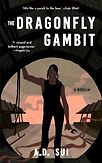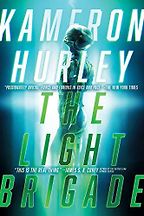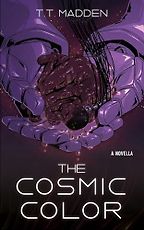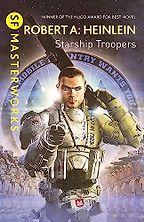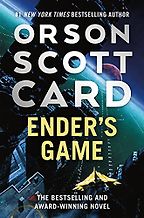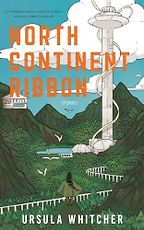There’s a lot of military novels out there. What does adding a sci fi lens bring?
That’s a very interesting question. I think, like with any other sort of story, adding a speculative element allows us to amplify a specific theme that we’re trying to explore as an author. Sometimes it allows authors to say what they want to say without being overly pedantic or on the nose about it. And sometimes it’s just fun! It’s something new, a different way to attract a reader. You may end up attracting a reader who usually wouldn’t read military sci fi, but they’re into spaceships, and they come for the tech and end up staying for the military sci fi aspect.
Let’s talk about your first choice. Could you tell us about The Light Brigade, by Kameron Hurley?
The Light Brigade was the first science fiction book I read after taking a nearly ten-year hiatus from reading any fiction. I used to be in academia, and that meant I was reading for a job: I could not use my eyeballs anymore to read for pleasure. So I stopped reading. Then, when I failed out of it, I went through the Hugo nominees for the past couple of years. I read the blurb for The Light Brigade and thought, ‘Wow, this is a very unique concept.’
The premise of The Light Brigade is that Earth is at war with Mars, and instead of physically shipping soldiers, we are breaking them down into light, into photons, and we’re teleporting them to different locations. That was the speculative hook. The world-building hook was that instead of nations, we now have corporations, and for folks who want to have housing and health care, that is all tied to different corporations. I’m so glad that we currently exist in the timeline where I’m going to learn whether I’m team Amazon or team Tesla, when it comes down to it… Even though I read the novel in 2022, it felt very pertinent to the times. And it felt like a very new, very modern take on military sci fi.
The cool thing that Light Brigade does is that there’s no gendered language for a long time in the book, and so you’re forming a relationship with the protagonist without knowing whether they’re male, female, non-binary, etc. By the time you realise, it doesn’t matter, because you’re already so invested in their story. And I think that is deliberate. The readership for military sci fi is generally male, and you don’t want to alienate anyone from the beginning, regressive as it may be to only read male protagonists. On a meta level, it also paints a very accurate picture of how the military as an institution erases a lot of individuality and personality, to the point where we no longer see the person for their gender identity, or their sexuality, or anything that makes them unique. We only see them as a soldier. That also plays very well with the corporate aspect of this world, where people no longer belong to themselves. They belong to these corporations. They’re products that can be traded, exchanged, etc.
This was my reintroduction into contemporary science fiction. I didn’t know you could write like that, because I grew up on old school sci fi. This was a very large tonal shift and it made me think, ‘Oh, I can write like this. I can’t write like the old guys did in the ’60s, but I can write like this – if I get good, maybe, one day!’
The book is often described as anti-war. Is that fair, and is that common for military sci fi?
I think there’s definitely a tonal shift happening. A lot of fiction coming out now that fits within the military side of the genre is highly critical of the institution of the military. It has to be. We can’t look at the current events and say that everything the military does is good and should be free from criticism. I think this is a very stark difference from the way that military sci fi was written earlier – I’m talking about the 60s and 70s – and I personally really like this direction change.
We’ll come to some more classic titles later on your list, but your next choice is another contemporary one. Please tell us about The Cosmic Color by T. T. Madden.
I love The Cosmic Color. It is a novella from Neon Hemlock, which also happens to be my publisher for The Dragonfly Gambit. I describe it as the Gundam book that I wanted to write, but didn’t have the chops to write.
The premise is that Earth soldiers are integrating with these giant semi-organic, semi-mechanical suits to fight alien-like monsters of an unknown origin. We’re following one of the pilots as he’s graduating from the training of being in this giant mecha suit, and how this maps out across our protagonist’s own gender identity; the embodied experience of being inside this giant mecha suit, versus the embodied experience of being in his male body. The Cosmic Colour also gets at military propaganda, and how there’s a very specific way that it’s always framed – the sort of people that appear on military posters, and the ways in which they appear on them.
It’s fun to see a novella on this list, because I think people often associate sci fi with doorstoppers. Does it change the feel of the story, that it’s told in such a short space?
I adore novellas from a pragmatic sense, because they are a quick read. It’s not an investment like a 150k-word book. But also, what makes a novella different is that you can have a very high-intensity, compressed experience of a single storyline. It’s very difficult to have several storylines within a novella and do them justice, so as an author, you tend to focus on one big plot. Maybe there is one subplot that you’re weaving through, but all of your attention is on that one plot.
I like to say that when you’re writing a novel, you need to justify each scene: Is the scene integral? If it’s not, goodbye. With a novella, you’re fighting for each paragraph, sometimes each sentence. You’re so much more deliberate with your words, with how you’re putting information down for your readers. They’re super fun and sometimes very frustrating to write because of this. I think the best prose, the best narration comes out of novellas, because you have this constraint, and it forces you to get creative about the way that you’re telling your story.
Let’s talk about your novella, The Dragonfly Gambit, which just won the Nebula for best novella – congratulations! Could you tell us about the central idea and how that idea came about?
The Dragonfly Gambit is a story about a pilot who has a career-ending injury that causes her to leave the military. A decade afterwards, she gets dragged in for a different purpose – but now with plans to destroy the fleet that she was once flying for. A lot of people like to say that it’s a story about revenge. It is, to an extent. But this was my attempt at military sci fi that was critical of the military-industrial complex.
I also really wanted to play with the idea of ‘every character sucks here.’ Everyone has a few redeeming qualities, but everybody is also kind of terrible in their own way. At the same time, because I’m working within this constraint, every character is there to illuminate and prop up a theme. It was fun to use my characters to have these conversations in a thematic sense.
It was originally supposed to be a Gundam story –
Sorry – that’s our second time using that word – could we quickly define it?
A Gundam is a giant mecha suit, and it comes out of Japanese animation and manga. I watched a lot of mecha anime, so I wanted to write something that had a conversation with that media, but it required so much engineering knowledge that I simply did not have.
It’s interesting, you mentioned that every character sucks, and I suppose they do, but I didn’t feel like I was reading about bad people. I felt like I was reading about institutionalised people with no choices.
Yes, I wanted to play with the idea of the other side of military propaganda: how do people come out on the other end? If there is an other end. If this is the framing and the messaging that they have been exposed to their entire lives, and if they are aware that those are their constraints… How do they survive in these very narrow constraints, when they know that they are disposable? When they know that there is nothing to return to, nobody is waiting for them; when their entire life is part of a system that they realise is incredibly corrupted and incredibly broken, but there’s no other option. That paints a very bleak story, in a way, but I also think it adds to the characterization. People do very questionable, rash, almost counterintuitive things because they always feel their back is against the wall.
The attitude of ‘burn everything to the ground’ comes from that. Dragonfly was an experiment: how far can I push these fictional people?
It feels like a real testament to what you were saying about the sci fi lens bringing people in for the fun – because yes, it was bleak, but also I had a great time reading it.
Maybe that’s a good point to bring in your next choice – could you tell us about Robert A. Heinlein’s Starship Troopers?
I love Starship Troopers. Maybe not so much for Starship Troopers as it exists, but because of the conversations that we keep having around it in 2025, even though the book was written in 1959. We talk about the book, and we talk about the 1997 movie as well, because that movie gave us so many classic memes, like ‘I’m doing my part.’
For those who don’t know Starship Troopers… It’s about a war that Earth is having with a bunch of aliens who are a bug-like species. The movie is a satire of military propaganda. It is one of those movies that, by today’s metrics, is so bad that it’s good. The book is very contentious, because I think a lot of times folks watch the movie, then go to read the book, and they’re expecting the same level of critique and very obvious satire – and then they get to Heinlein’s writing, and it’s not that. In fact, it reads like Heinlein was pro-military – like he supported a militarised state, felt it was good for the citizens and taught them civic responsibility, and that basic training was a way to make really soft men into functional members of society.
The more you read it, the more you begin to think that it’s so heavy-handed that he couldn’t possibly mean it in earnest. But at the same time, it’s not like Heinlein’s other works were completely unproblematic, even by the standards of the 60s. So maybe he did mean that… That’s a little scary, and also makes sense given that this was written during the Cold War. A lot of folks take this book and make allegories to communism and the Red Scare. Others are dissecting it for the craft and saying that it’s very interesting how Heinlein doesn’t mention the race of his protagonist, or what his mother tongue is, until much later in the book. Is this deliberate? Or was Heinlein just trying to do a self-insert, and then remembered suddenly that people from other places in the world exist?
This is a book that was written in 1959, and we’re still continually going back to this work and dissecting it. A lot of modern military sci fi calls back to Starship Troopers. And again, the film is great if only for the memes.
In this choice and your next, we have a very alien enemy. Does that change the stories we can tell?
As authors, we have to be very careful when we’re writing: there is a specific way in which you can write your enemy that justifies the violence. If the genuine desire here was to justify the violence, then making your enemy very alien and trying to remove the empathy that your reader may feel for them is a way to get the reader on your side, and it’s a tried and true technique of propaganda by authoritative governments. When you begin to remove humanity from a particular group of people, it makes it much easier for some to commit violence against them. As authors, we have to be very, very careful about how we portray ‘the enemy’, because we don’t want to perpetuate the same kind of ideas, especially today.
Your next choice is another classic: tell us about Ender’s Game by Orson Scott Card.
Ender’s Game is a book that you read when you are twelve or thirteen, and you come for the cool war games in zero gravity. Then you read it as an adult, and you find yourself mortified the entire time. It’s another book about a war that Earth is having (Earth is having a lot of wars), with another enemy that is very bug-like (Earth also really doesn’t like bugs. I don’t know what’s up with that.) The military is recruiting incredible, almost savant-like children to become their officers and their strategists. Ender is unique from the moment that he is born, because he is the third child in his family and there are birth quotas: the only reason his parents are allowed to have him is because his brother and his sister already show incredible cognitive abilities, and there’s a belief that he will also be incredibly intelligent.
Ender has a rough time growing up. His brother is mean and bordering on sociopathic. His sister is a lot nicer, but that doesn’t make things much better. But after Ender commits a very violent act at school, he gets scouted by the military, and they say, ‘Why don’t you come with us and train?’ – so he does. And that’s when the cool part of the book starts, because there are a lot of simulated war games that he participates in. I remember reading this as a preteen, and thinking, ‘Wow, that is so cool, this training montage is really fun…’ And then I returned to the book when I was in my late twenties, and I realised that the entire book is about how an institution is turning ten-year-olds into soldiers who do not question their orders and who truly, genuinely believe that what they’re doing is right. And again, call back to the mecha genre: that’s a theme that comes up in a lot of Gundam anime, because the protagonists tend to be teens, and when you watch it as a teenager you think it’s cool that they get to fly these mecha suits and engage in battle. But when you think about it as an adult, you realise that they’re child soldiers, and they never really had a choice whether to participate in this or not.
I think Ender’s Game is great for that reason: you can read it at different stages in your life, and you can take away a very different experience of the book.
We’ve come to your last choice, and it’s a big tonal shift: could you introduce North Continent Ribbon by Ursula Whitcher?
This is another Neon Hemlock publication. It was the finalist for the Ursula Le Guin prize this year, and I was not surprised. It’s a short story collection, and it follows a very, very distant future civilization through hundreds or thousands of years. They’re standalone stories, but they’re all intertwined because they’re all in the same history. It traces the civilization from the first inklings of trouble to its grand finale.
It’s not a typical military sci fi book, but the military and armed conflict and those themes come up over and over again in these different stories. Sometimes they are from the outside looking in, of civilian relations to the military, and sometimes it switches to those in the military and how they feel about this institution, and what they feel their role is. The entire collection is held together by all of these tensions.
It’s a very large-scale story because it covers thousands of years, but it still feels incredibly intimate and very character-driven at all times. I want to say that it is critical of the military’s role, but at the same time, some of the characters are in the military, and you kind of understand their position. It manages to be critical while never dehumanizing anyone.
It’s such a beautiful short story collection. Ursula Whitcher is a mathematician, and I don’t know how that’s relevant, but you can tell when you read it. She’s also a wonderful writer, and that definitely comes through. I’ve been enamoured with this short story collection ever since I read it while going to the launch. My train stopped, and I was praying that the delay would be long enough for me to finish reading it before I got in!
There’s a running theme around AI as well, right?
Yes. I don’t want to spoil anything, though. AI is a central theme. It begins with little whispers and stories, and these hints are dropped in a very skillful way – it doesn’t feel like, ‘Oh look, a hint is being dropped’ – but they begin to pull together. It feels like an avalanche starting, where at first there are a few snowflakes, and that eventually builds until it becomes a critical mass. It’s so masterfully done because it takes a few stories for you to start to suspect where things are going. And by the time you get to the final novelette, you have an understanding that there’s no other way this could end. It’s just masterful from a craft perspective.
High praise!
I recommend it to anyone. If people are going to read anything from what I’ve recommended, North Continent Ribbon is the top of my recommendations. I think this collection deserves so much love and so much recognition and I will continue to scream its praises into the world.
Interview by Sylvia Bishop
October 29, 2025. Updated: November 27, 2025
Five Books aims to keep its book recommendations and interviews up to date. If you are the interviewee and would like to update your choice of books (or even just what you say about them) please email us at [email protected]
Five Books interviews are expensive to produce. If you've enjoyed this interview, please support us by donating a small amount.

